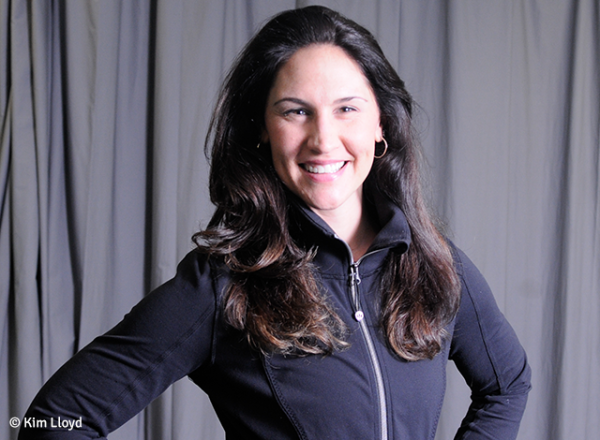I have a BIG treat for you. My wife, Dr. Lisa Lewis, is making a much anticipated cameo on my site today. People loooove when she chimes in and writes an article for the site. Tony Gentilwhonow?
Enjoy.
She trains. Hard. Makes progress and achieves goals. Inspires and impresses others. She balances work, finances, family, friends, food, and her fitness. The fact is: she’s amazing. But the feeling? It’s often something quite different.

A woman wrote to me several months ago about being stuck. She explained:
“[Lifting] is hard, I put in tons of effort and I struggle to be ok with this…the fact that it doesn’t come easily to me despite all my hard work, sweat, and effort. I struggle with feelings of disappointment and feeling like I am letting myself down and my trainer down if I do not perform to MY unrealistic expectations… I fall into the comparison trap and thinking I “should” be like some random girl I will follow on Instagram. It SHOULD be easier. I SHOULD be squatting 225 for reps. Sometimes I struggle to celebrate the small victories and instead get down for the little things I didn’t do… the doubtful voice in my head or other distractions/stressors of life (work, relationships, etc)… still creeps in there, especially mid set if 1 of my reps wasn’t “easy” or “perfect”.
Sounds sad. Sounds frustrating and lonely. Sounds like a fun-sucking, comparison-focused, judgmental, negative, cycle.
Sound familiar?
Perfectionism has been defined in many ways. The “refusal to accept any standard short of perfection,” means that the perfectionist rejects any outcome or effort that is devoid of flaws… less than The Most… secondary to superlative. And in order for the perfectionist to ‘accept’ an outcome, it must be possible for there to even be such a thing as “perfect” in the first place.
What About the Strength Training Perfectionist?
Perfectionism can be viewed as a personality strength in athletic contexts (Hill, Gotwals, Witcher &

Leyland, 2015). As you might imagine, dedication and intense pursuit of success bode well for those in pursuit of a lofty (or in this case, heavy) goal.
Joachim Stoeber, professor of psychology at the University of Kent, recently described perfectionism as a “double edged sword” (2014). On one hand, perfectionism can be motivating. It can help us to feel determined, to fight for our goals and make the sacrifices necessary to progress in our training. On the other hand, perfectionism can fuel our inner-critic. It can keep us focused on our short comings and blind us to any progress we’ve made along the way.
Strive for perfection – but don’t be concerned about past imperfection.
Researchers of perfectionism have described healthy and unhealthy subtypes of perfectionism (Flett & Hewitt, 2005; Stoeber & Otto, 2006). Sometimes referred to as ‘healthy perfectionism’ and ‘neurotic perfectionism’, clear themes have emerged. Striving for perfection means to focus on the process (which I’ve written about in the past).
The striving perfectionist uses her energy to move toward the goal, as opposed to worrying about the outcome. In contrast, the neurotic perfectionist ruminates on past performance that was imperfect. She judges herself harshly, talks down to herself, and ends up feeling defeated, deflated, and less-than. She gets ‘stuck’, and not only does this lead to feeling bad, it has deleterious effects on future performance!
How to Strive for Perfection

Set goals. Don’t shy away from your aspirations – but be intentional. Specifically, I recommend setting a goal, and being as specific as possible. Identify a timeline for your goal, and check in with a friend, gym-buddy, or professional about it – is this realistic?
Set yourself up for a 99% chance of success. If and when life gets in the way (catching a cold, going away for a long weekend, having a “pizza-emergency”) be flexible and adjust your goal so that you can stay on track with progress and continue to move forward. Any thought process or goal that keeps your focus on the past, and makes you feel bad about yourself, is a total waste of your time.
I cannot stress this enough: when you get down on yourself, and stuck there, you are wasting your time, and your energy, and you have nothing to gain. When you do have a setback or a failure, remember it’s just data and use the information to adjust your goals, reframe your intention, and keep it movin’!
Do Not Concern Yourself with Imperfection
Researchers and optimists agree: getting down on yourself for not being “good enough” is useless. Over the years, I’ve heard clients tell me they think it is productive to beat themselves up or shame themselves after a “failure”.
Some describe this as punishment, or penance for imperfection. Punishment is significantly less effective than reward. Reinforcing what you do correctly will keep you on track in the long run; punishment may have some temporary, short-term benefits, but those will quickly lose their power, forcing you to either get meaner with yourself, or abandon your goal altogether.
If you get stuck with perfectionistic concerns, here are some quick tips:
1) Turn the page: Remind yourself you’re wasting precious time and energy! Re-focus on the next opportunity to work toward your goal.
2) Re-frame “failure:” It’s just information. Falling short of your goal doesn’t mean anything about your worth, your value, or your capacity for improvement. It’s just a data-point that is relevant to that particular performance. Process it, consider how it can inform future goals and performances, and then move on.
3) Lighten up!: There are many benefits to being a perfectionist… so maximize the benefits and minimize the drawbacks. If you’re getting all bent out of shape about being 10 pounds short of a PR, or 3 pounds shy of your goal weight, simmer down! Your missing the forest for the trees. You’re missing out of feeling strong, healthy, happy, and fabulous, all because you’re off by a few digits. How silly can you be?!
Good luck!
NOTE: Lisa will be co-presenting with Artemis Scantalides on the I Am Not Afraid to Lift (The Power of Mindset Edition) on Sunday, November 6th at my studio here in Boston. Only 2-3 spots are available.1
Register TODAY under ‘EVENTS’ HERE.
Citations
Flett, G.L. & Hewitt, P.L. (2005). The perils of perfectionism in sports and exercise. Current Directions in Psychological Science, 14, 14-18.
Hill, A.P., Gotwals, J.K., Witcher, C.S. & Leyland, A.F. (2015). A qualitative study of perfectionism among self-identified perfectionists in sport and the performing arts. Sport, Exercise, and Performance Psychology, 4, 237-253.
Stoeber, J. (2014). Perfectionism in sport and dance: A double-edged sword. International Journal of Sport Psychology, 45, 385-394.
Stoeber, J. & Otto, K. (2006). Positive conceptions of perfectionism: Approaches, evidence, challenges. Personality and Social Psychology Review, 10, 295-319.
About the Author
 Dr. Lisa Lewis is a licensed psychologist with a passion for wellness and fitness. She earned her doctorate in counseling psychology with a specialization in sport psychology at Boston University, and her doctoral research focused on exercise motivation. She uses a strength-based, solution-focused approach and most enjoys working with athletes and athletically-minded clients who are working toward a specific goal or achievement.
Dr. Lisa Lewis is a licensed psychologist with a passion for wellness and fitness. She earned her doctorate in counseling psychology with a specialization in sport psychology at Boston University, and her doctoral research focused on exercise motivation. She uses a strength-based, solution-focused approach and most enjoys working with athletes and athletically-minded clients who are working toward a specific goal or achievement.
Lisa is also a certified drug and alcohol counselor, and has taught undergraduate courses as an adjunct professor at Salem University, Wheelock College, and Northeastern University in courses including exercise psychology, developmental psychology, and abnormal psychology. Lisa currently works as the assistant director of a college counseling center in Boston, MA, and she has a small private practice in the nearby town of Brookline.
As a new addition to the “I Am Not Afraid To Lift” workshop, Lisa will integrate mental skills into the physical skills training of the day. Mental skills can enhance performance, maximize motivation and prevent barriers like negative thinking, fear, and self-doubt from interfering with goals.



